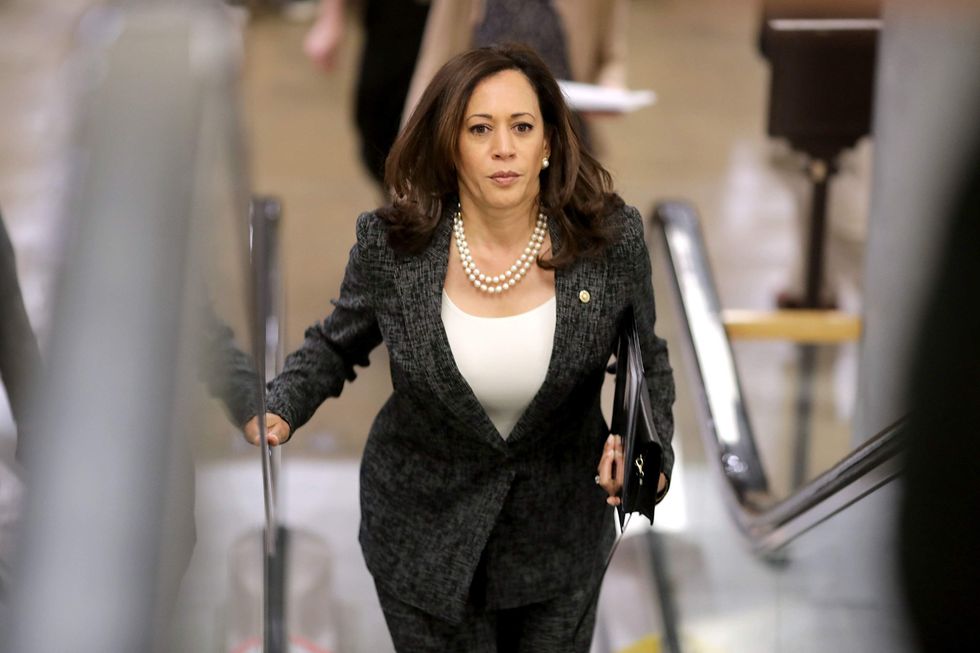
Sen. Kamala Harris (D-Calif.)
and other Democrats hope to make the 2020 election a referendum on single payer healthcare in the United States.
(Photo by Chip Somodevilla/Getty Images)

The way-too-early smart money on the 2020 Democratic presidential primary is on freshman California Sen. Kamala Harris. This is true both figuratively and literally — Harris checks all the boxes the Democrats are looking for in a candidate, and she has already begun corralling the formidable Clinton money machine in preparation for a widely anticipated presidential run.
Add all this up, and Harris' announcement that she will co-sponsor a single-payer health care bill with liberal favorite Sen. Bernie Sanders (D-Vt.) likely signals that Democrats believe the time to run on the issue has officially come.
Of course, it is no secret that most Democratic nominees for president have harbored a desire to see single-payer health care implemented in the United States, but it is rare for a legitimate front-runner to openly embrace a single-payer platform. 2016 nominee Hillary Clinton studiously avoided discussion of a single-payer plan during her last run for president. Although she walked a fine tightrope during the period that Sanders challenged her from the left in the primary, when she engaged in the general election, both her campaign website and her stump speeches refused to endorse any single-payer system in America.
Likewise, Barack Obama was caught on tape in 2003 saying that he believed in a single-payer health care system, but during the 2008 campaign he walked back this statement and even attempted to pretend that he had never been in favor of a single-payer system.
Former President Bill Clinton may have had the most ambitious health care rhetoric of any Democratic candidate in memory, but even his plan consisted of a mandate for employers to provide health care coverage for all employees, not outright government control of the health care sector.
Harris' main early potential primary foe, Sen. Elizabeth Warren (D-Mass.), is likewise openly in favor of a single-payer health care system.
By staking out an early position that is openly in favor of a single-payer system, Harris and Warren have made it exceedingly difficult for any of their potential Democratic challengers to take a more moderate approach on health care, for fear of being labeled a conservative toady or quisling. This is especially true in light of Democrats' belief that Hillary Clinton's 2016 loss signals that triangulation is a losing strategy.
Whether true or not, many Democrats believe that Clinton lost because she didn't stand up for liberal principles enough. It seems like a virtual certainty that any candidate who is not well to the left of where Clinton was will be doomed when the vote counting begins. The Democratic 2020 pump has been primed to produce an unprecedentedly liberal nominee since the day Trump won.
Now, with both of the early favorites openly embracing the crown jewel of liberal policy, any candidate who does toe the line will begin with a huge disadvantage with Democratic primary voters. One axiom of politics is that in any contested primary, the also-rans shoot for ideological purity and the front-runners avoid firm policy positions in order to allow themselves as much room as possible to triangulate in the general.
If the front-runners are already for single-payer, how can any also-ran grab any oxygen at all unless they also openly advocate for single-payer?
Any issue as potentially monumental as the nationalization of a huge portion of the American economy will, of necessity, take center stage in the general election — and Democrats are increasingly optimistic that this is a fight they can win. Polling suggests that America is slowly coming around to the idea of a single-payer health care system. In just two years, support for a single-payer system jumped from 28 percent in 2014 to 33 percent in 2016. More worryingly, 60 percent of Americans stated in 2016 that it was the government's responsibility to make sure everyone has health insurance, as opposed to only 39 percent who said that wasn't part of the government's responsibility at all.
Although some recent polling has been more ambiguous on public support for a single-payer system, the polling does show one consistent trend: as more time goes by, more Americans are in favor of it. Democrats are betting that in four years, the tables will have turned completely in their favor, especially with the looming troubles (primarily induced by Obamacare) that the private insurance market is expected to face over the next four years.
In other words, having set up a legal framework that doomed the private health care system to failure, the Democrats hope they can reap the rewards when the system fails under Trump.
Time will tell if their strategy will ultimately succeed with the voters, but it seems clear that the Democrats plan to give it their best shot in 2020.